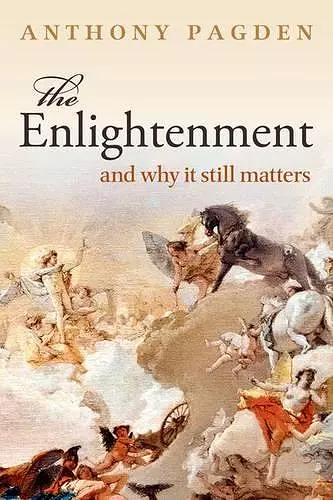The Enlightenment
And Why it Still Matters
Format:Paperback
Publisher:Oxford University Press
Published:5th Feb '15
Currently unavailable, and unfortunately no date known when it will be back

The Enlightenment and Why It Still Matters tells nothing less than the story of how the modern, Western view of the world was born. Cultural and intellectual historian Anthony Pagden explains how, and why, the ideal of a universal, global, and cosmopolitan society became such a central part of the Western imagination in the ferment of the Enlightenment - and how these ideas have done battle with an inward-looking, tradition-oriented view of the world ever since. Cosmopolitanism is an ancient creed; but in its modern form it was a creature of the Enlightenment attempt to create a new 'science of man', based upon a vision of humanity made up of autonomous individuals, free from all the constraints imposed by custom, prejudice, and religion. As Pagden shows, this 'new science' was based not simply on 'cold, calculating reason', as its critics claimed, but on the argument that all humans are linked by what in the Enlightenment were called 'sympathetic' attachments. The conclusion was that despite the many tribes and nations into which humanity was divided there was only one 'human nature', and that the final destiny of the species could only be the creation of one universal, cosmopolitan society. This new 'human science' provided the philosophical grounding of the modern world. It has been the inspiration behind the League of Nations, the United Nations and the European Union. Without it, international law, global justice, and human rights legislation would be unthinkable. As Anthony Pagden argues passionately and persuasively in this book, it is a legacy well worth preserving - and one that might yet come to inherit the earth.
deep and thought-provoking argument for how the enlightenment still affects modern social and political thought. There is so much information packed into in these pages, yet its well-organised, meticulously referenced and presented so masterfully that the book is a pleasure to read. I think those who enjoy reading about philosophy and history will enjoy this book, as will those who seek to gain a deeper understanding the philosophical, political, and social development and dominance of the modern Western World. * Guardian, GrrlScientist *
Deftly revealing how bold thinkers chucked out the lumber of millennia, Pagden throws up contemporary resonances on page after page. * Independent (Radar Magazine) *
Learned eloquent and at times passionate. * Keith Thomas, New York Review of Books *
Book of the Week * The Sunday Telegraph *
Both Pagden's retelling of the Enlightenment story, and his defence of cosmopolitanism, are cogent and important. * The Independent *
[E]legant and wide-ranging. * Jonathan Israel, TLS *
The grand architecture of [Pagden's] argument is finely ornamented with nuance and qualification. * Colin Kidd, London Review of Books *
Pagden writes beautifully and has a wonderful eye for apt quotations, many of which eloquently capture the spirit of the Enlightenment literati. * History Today *
The Enlightenment is a spirited and engaging polemic directed against the recourse to fundamentalism in modern history. * Richard Bourke, Literary Review *
With religion resurgent across the world - complaining of oppression at every turn - the Enlightenment project, never completed, is at risk again. As this eloquent and thrilling book makes clear, its enemies might care to explain why it happened in the first place. * Ian Bell, The Glasgow Herald *
Written with exemplary clarity, [this book] exposes the classical roots of the critical attack on religious traditions, and explores new discourses around a scientific study of humanity...While Pagden pauses to consider the dark side of Enlightenment ideas, the power of the book lies in its lucid exposition of optimistic thinking, from Condorcet's conceptual history to Hume's brutal attack on organised religion as "sick men's dreams". If one wanted a handbook of optimism, Pagden's work would be a set text. * BBC History Magazine *
A sensationally good piece of cultural and intellectual history reminds us how the 'Western' view of the world came into existence and why it's worth defending. It does still matter * Oxford Today *
The Enlightenment really does still matter, and with a combination of gripping storytelling about colourful characters and lucid explanation of profound ideas, Anthony Pagden shows why. * Steven Pinker, author of The Better Angels of Our Nature and The Blank Slate *
Reading Anthony Pagden's The Enlightenment: And Why It Still Matters is an enlightenment in itself. The larger-than-life thinkers and talkers of eighteenth-century Europe have been blamed for everything from taking the magic out of life to making Auschwitz possible, but here, in sparkling style, Pagden shows us not only how their ideas made mankind modern but also what our world might have been like without them. Everyone interested in where the West came from should read this book. * Ian Morris, author of Why the West Rules-For Now *
Anthony Pagden defends the Enlightenment as a cosmopolitan project with classical roots and contemporary relevance. Like Kant, he argues that we live in an age of enlightenment, ongoing but incomplete, but that someday we will experience a fully enlightened age. His lucid and learned book might help to realize that hope. * David Armitage, author of Foundations of Modern International Thought *
Pagden demonstrates the breadth and depth of his knowledge and his impeccable research of the period we refer to as the Enlightenment A book that should be on every thinking person's shelf-the perfect primer for anyone interested in the development of Western civilization. * Kirkus Reviews *
ISBN: 9780198700883
Dimensions: 233mm x 156mm x 34mm
Weight: 720g
466 pages